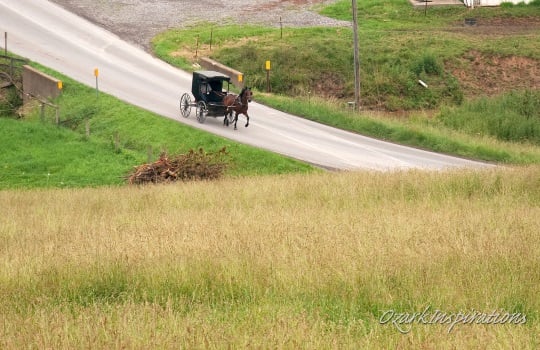Amish=organic?
The environment is a hot topic these days. Outsiders view the Amish as an environmentally-friendly people. And since they ‘live like it’s 200 years ago’, they surely must stick with all-natural means of raising their crops, right?
photo: turkeycreeklane.com
Though there is probably truth to the idea of a particular sort of ‘Amish stewardship’ of the land, this does not automatically mean that the Amish farm without chemicals. Though in some areas organic farming is enjoying growing popularity among the Amish, the majority of Amish farms are non-organic.
I recently asked a good friend in Lancaster County, involved in an organic co-op, why more of his people don’t switch to his way of farming.
It seems to make sense for at least two reasons–if not to leverage the marketing message, i.e., organic seems more in sync with what general public perception of the Amish is anyway (though perhaps since many already assume that ‘if it’s ‘Amish’ it’s got to be ‘all-natural”, this might not make much of a difference from the marketing standpoint–in other words, many likely ‘buy Amish’ because they already see ‘Amish’ as synonymous with ‘organic’), then why not for the higher prices the organic market affords?
Part of the reason is that there is a cost involved in turning a farm that uses fertilizer and pesticides into an organic one. During the three-year conversion period, some farms may suffer a production decrease. Lower yields are recouped later through the organic premium, but some ag-men are turned off by this barrier to entry.
The other reason, my friend claims, has to do with the inertia of tradition and resistance to novelty present in his community. Fear of change and deviating from the way dad and granddad and great-granddad did things prevents more farmers in his area from making the switch, he claims.
There is also the perception that you can’t do well at organic farming. My friend says that that is not necessarily so, and points to his involvement in the co-op as an example of how local farmers have used organization and clever management to improve distribution and the prices their members receive.
Organic is doable and some would say a good fit for the Amish and their labor-intensive, small-acreage manner of farming. Regardless of whether organic is truly better for you, or if it’s really worth paying triple-price for your arugula, ‘organic’ is clearly more than just a trend–a growing market that a (still) limited number of Amish are tapping into.





Greetings
We have an organic farm here in VT. What really gets me is that chemical farming did not start till the 1900s, mostly after WW2( they needed an outlet for all the chemicals they used in bombs, and found they could make fertilizer. So from the fall of Adam till early 1900s all farming was “all natural” (organic!) So why have we accepted chemicals so freely, when for so long we did with out? Another scarry thing is there is not alot of long term testing on these chemical products. I used to farm w/ chems(and am not judging any farmers who do) but am so glad i dont now. My kids can eat our produce and drink our milk and i dont have to worry about chemicals. Also handling these chemicals(filling sprayers) etc, is enough to make anyone think twice. It is very easy to get nitrogen,potash,calcium,lime by natural means, manure, woodash, cover crops, compost etc. Also insecticides kill good bugs and good organisms is your soil as well as the pests(which makes a dead soil) Farming naturally I feel more in tune with Gods creation and its natural cycles. Keep up the good work
The idea of organic farming is growing tho. I remember seeing some articles on the subject in Family Life.
There are probably some other factors that would prevent the Amish from embracing organic farming practices on a wholesale basis, or at least marketing their products that way. Some farmers, both Amish and non-Amish who do not use any chemicals in their production practices are not using the term “organic”, because to do so now requires a certification. While I am not sure how vigorously it is being enforced, it is now illegal to use that term unless you are certified to do so. A certification process that I am told can be quite an ordeal, yet doesn’t really ensure that truly organic practices will always be followed.
Also, there is a fairly widespread belief that now that organic has gone mainstream the large corporate farmers are moving into the market to capture the premiums that organic farmers have historically enjoyed, while not being fully committed to the process. Many people feel that the newest wave of organic farmers are probably only organic in the loosest sense of the word. Additionally, even among the truly organic producers there is some recognition that many consumers care more about “locally produced” than they do about whether the product is organic. I am currently leasing land with the goal of producing an all natural, grass finished beef animal. I do not plan to pursue the organic label, though agree that concept of organic production is very sound and sustainable. I think that many Amish might feel the same.
Organic or not, I’m looking forward to seeing the signs like the ones pictured above hanging by the roadside. 🙂
Amish and Organic
I agree. Now that the giants are trying to get a piece of the market as usual. Monsanto will find a way to go around the Organic regulations and serve us again with law quality foods that will still harm the enviroment and our health. I do buy organic and or local as much as possible. But I will try to purchase more local, small farm products and naturally produced. Thanks for the information.
Update on chemicals requested
Hello, I was born and raised in Ohio and live in the desert of Arizona where some of my family used to live. I have been asking my community for years to please stop using pre-emergents, pesticides, herbicides, etc. One of the men in my community said that if the Amish use them, we will, too. There are so many reasons not to use these chemicals: they dry out the soil, they kill pollinators (bees, butterflies, wasps, etc.), pollute, add to climate issues,cause many health issues in humans and are made by large corporations who are not good for any of us in many ways.
Would you please update me on the status of these chemical usage in Amish farms? I would like to share it with my community.
Thank you.
Thank you Robin, I appreciate your comments about this very important topic, and I have the same questions regarding Amish practices with GMO (genetically modified organisms) and Roundup. Jeffery Smith has done great work in this area and wrote two books, “Seeds of Deception” and “Genetic Roulette”. Here are some videos:
Genetic Roulette trailer – https://www.youtube.com/watch?v=6QEKPU-figI
How to Eat a Non-GMO Diet with Jeffrey Smith – https://www.youtube.com/watch?v=-MU77i8Xu8Y
Conversations w/Great Minds – Jeffrey Smith GMOs – Seeds of Deception P2
https://www.youtube.com/watch?v=6D3TUk-XX1o
No to: GMO's, Round-Up, Off-Brands, Toxic Chemicals
Yes, I agree, Stephanie- no to GMO’s and Round-Up (no to all toxic chemicals) thank you for the videos. Follow Nature’s ways which are nature’s intelligence and stop allowing corporate greed and egos which are damaging and creating more problems.